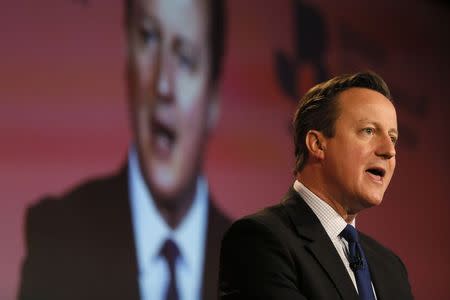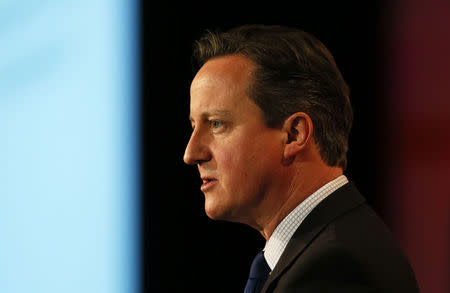Cameron's glitzy ties to rich donors hurt him before UK election
By Kylie MacLellan LONDON (Reuters) - Shoe shopping with the interior minister, tea with the Mayor of London, and a run with the education minister. All this and more was sold to the highest bidder by Prime Minister David Cameron's Conservative Party at a glitzy fundraiser this month. Faced with a close national election on May 7, Cameron's party is replenishing its coffers, and the auction -- for wealthy backers at an upscale London hotel -- was a showy display of how it woos donors. It highlighted a problem for Cameron: the perception that his party is full of rich people and run for rich people unable to grasp the realities of ordinary voters' lives. The event would always have attracted criticism given growing concern about the gulf between rich and poor. The fact that it coincided with a scandal at HSBC's Swiss banking arm, where numerous Conservative donors bank, turned it into a media car crash. "Porn barons. Shady financiers. Hedge fund kings. Welcome to the secret Tory (Conservative) ball," was one of many disapproving headlines. Cast by Labour as out of touch and led by an over-privileged "toff" or posh person, the Conservatives charged backers up to 1,500 pounds ($2,300) to attend the fundraiser, according to local media. Supporters, some in tuxedos, arrived by Rolls-Royce. A bronze statue of Conservative idol Margaret Thatcher was reported to have fetched more than 200,000 pounds; a romantic getaway via private plane to a Greek island, which included a daily champagne breakfast, went for a similar price. Cameron came under more pressure in parliament soon afterwards over a tax scandal engulfing HSBC's Swiss arm when Labour accused the Conservatives of accepting donations from "dodgy" HSBC account holders. Labour leader Ed Miliband, whose party is largely bankrolled by trade unions, sought to portray Cameron, a descendant of King William IV and an alumnus of the elite Eton College, as being in hock to the rich. "This is a prime minister who will not tackle tax avoidance for the simple reason that too many of his friends would get caught in the net," said Miliband. Cameron, who says his government has moved to clamp down on tax avoidance, did not dispute the donations, from seven individuals, and there is no suggestion the account holders did anything illegal. But Labour's attack hit home. A YouGov poll afterwards found 47 percent of voters deemed the way the Conservatives were funded as "dodgy", against 33 percent for Labour. 'EVERYONE AVOIDS TAX' Further damage was done by an admission from Conservative donor and former party treasurer Stanley Fink, one of the HSBC account holders, who said he had avoided tax as "everyone does". "It would be an exaggeration to say this is the kind of thing that could lose a party an election, but it is the kind of thing that could contribute," Tim Bale, politics professor at Queen Mary University of London, told Reuters. "Labour at this election will be playing the card that the Conservative Party doesn't understand ordinary people and some of the stuff they have done with fundraising over the last couple of weeks suggests that might be true." Cameron's backers are delivering. Latest figures show that in 2014, Cameron's party attracted nearly 29 million pounds ($45 million) in donations, compared to Labour's nearly 19 million pounds. The Conservative Party spent more than double Labour's total at the last national election, in 2010, and Labour's election strategy chair Douglas Alexander predicts his party could be outspent by three to one this time. While there are limits on how much parties and candidates can spend during an election campaign, which were quietly increased by the Conservative-led coalition last year, there are no limits on donations. Labour has its own funding image problem. The Conservatives accuse the trade unions of buying Labour's leader, candidates and policies. Ed Miliband beat his brother to the Labour leadership in 2010, thanks largely to the unions, despite the majority of Labour lawmakers saying they preferred the other Miliband. Miliband has since sought to reduce the influence of the unions, at the risk of hurting his funding. Britain's largest union, Unite, says it won't let Labour be under-resourced against the parties of "global capital and the super rich", and in January donated 1.5 million pounds. Unite and fellow unions UNISON and GMB were among the biggest donors to political parties in the final quarter of 2014, giving Labour more than 1 million pounds each. Labour is also accused of hypocrisy after a large donation from professional services firm PwC. "Labour accepts 385,000 pounds from accountancy giant which Miliband's own MPs accuse of promoting tax dodging on 'industrial scale'," screamed the right-leaning Daily Mail newspaper. There is no suggestion PwC did anything illegal. Still, the influence of Labour's donors is arguably more transparent than that of the Conservatives' backers given the formal role which the unions play, said Bale. Members of the Conservative "Leader's Group", who donate at least 50,000 pounds a year, are invited to join Cameron at social events. "What donors get ... is access," said Justin Fisher, a politics professor at Brunel University. "Now access doesn't guarantee influence, because the mere ability to talk to someone doesn’t mean you are going to persuade them. But the key thing about this is that it causes public disquiet." ($1 = 0.6503 pounds) (Editing by Andrew Osborn and Giles Elgood)

 Yahoo News
Yahoo News 

